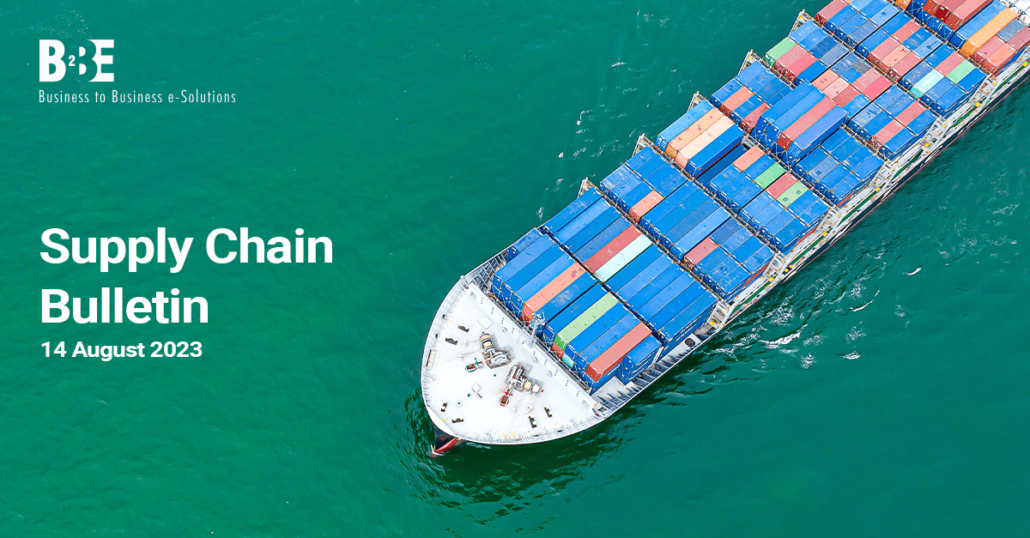This is your weekly supply chain bulletin from B2BE for the week starting 14th August 2023.
Each week, we bring you a rundown of the latest trends in the news from across the supply chain industry. We cover the issues most important to you, bringing you useful links to the full articles. This ranges from news on various supply chain disruptions to strategies to lessen the damage. We also include other relevant supply chain related updates. If you missed it, you can read last week’s supply chain bulletin here. Read on to see what’s making the news this week.
Key findings from GEP Supply Chain Volatility Index
GEP’s Global Supply Chain Volatility Index for July indicates a sharp rise in excess capacity across global supply chains, with a reading of -0.50 compared to -0.26 in June. This increase in excess capacity reflects weak global demand conditions and on-going warehouse destocking. The index also highlights a global divergence in demand conditions, with Europe and the UK experiencing sharper declines in demand compared to North America. European supply chain spare capacity reached its highest level since the 2008-2009 global financial crisis. Additionally, the cost of global transportation has fallen to its lowest level since January 2016. Meanwhile reports of backlogs due to labour shortages are historically low. The index is based on a monthly survey of 27,000 businesses. It serves as a leading indicator for procurement and supply chain professionals.
How businesses in Europe, UK and US are mitigating supply chain risk
This article discusses the various drivers of supply chain disruption in both the United States and Europe, examining the challenges that businesses are currently facing. The onset of the COVID-19 pandemic marked a period of turmoil, affecting various aspects of the economy, such as inflation surging to levels not seen since the early 1980s. The globalisation of supply chains has made sourcing goods more complex and uncertain.
In Europe, while the worst days of COVID-related disruptions might be behind, the enduring effects remain. “Long COVID” and early retirements have reduced the available workforce, straining supply chains’ productive capacity. In addition, the war in Ukraine has caused significant disruptions, impacting steel exports, commodity shortages due to sanctions on Russia, and seafarer shortages. The energy crisis, exacerbated by geopolitical events, has led to cost inflation and supply chain issues in industries with high energy demands. Natural disasters and climate change have also played a role, affecting transportation systems and creating demand surges for certain materials.
Mondelez International invest in advanced recycling to create sustainable supply chain
Mondelēz International, a global snack brand company known for brands like Cadbury, and Amcor, a global leader in responsible packaging solutions, have partnered to invest in advanced recycling technology company Licella in Australia. The collaboration aims to promote a circular economy for plastic packaging in the country. They plan to achieve this by supporting the construction of one of the first advanced recycling facilities using Licella’s innovative Catalytic Hydrothermal Reactor (Cat-HTR™) technology.
Cat-HTR™ is an advanced hydrothermal liquefaction (HTL) technology. It utilises hot, pressurised water to recycle end-of-life plastic into a crude oil substitute suitable for producing new food-grade plastic packaging. The new facility, called Advanced Recycling Victoria (ARV), is expected to process about 20,000 tons per year of end-of-life plastic initially. There are further plans to scale up to 120,000 tons per year. This initiative is a significant step toward reducing plastic waste and promoting sustainability in packaging.
Rising costs of insurance premiums in Australia
Rising home insurance premiums in high-risk areas of Australia are causing concerns that households might abandon insurance altogether. According to a report by the Actuaries Institute, median home insurance premiums rose by 50% for properties in flood-prone areas and by 28% overall in the year to March. The report highlights that nearly one in eight Australian households are considered “affordability stressed,” spending more than four weeks of their annual income on home insurance. The report suggests urgent policy recommendations to ease the burden on communities facing threats from floods, cyclones, and bushfires. These recommendations include risk reduction measures, reform of insurance-based taxes, targeted subsidies, and cost-share measures such as an insurance pool for floods. The rise in premiums is attributed to building cost inflation, supply chain shortages, and the increasing occurrence and severity of natural disasters, exacerbated by climate change.
About B2BE
B2BE delivers electronic supply chain solutions globally, helping organisations to better manage their supply chain processes, providing greater levels of visibility, auditability and control. We’re driven by a passion for what we do, inspired by innovation, and underpinned by a wealth of knowledge. With over 20+ years of experience, the B2BE teams operate worldwide.
Ga voor meer informatie naar www.b2be.com.
